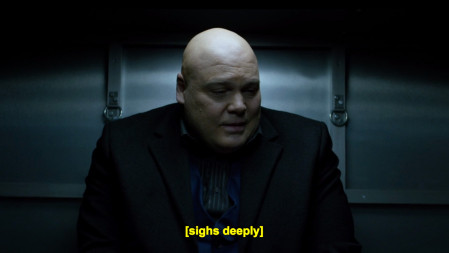Daredevil and The Samaritan
My goal with this blog is primarily to dish up tasty behind-the-scenes glimpses of Black Rose, post our latest news, etc – but I’m also going to chat about other nerdy pop culture stuff from time to time. As a writer, I’m always on the hunt for new stories, and can’t help dissecting and critiquing what I find in order to refine my own craft.
Since you, dear reader, are currently reading a blog post on a webcomic site, I can safely assume you are also deeply ensconced in nerd culture. Excellent.
I recently finished watching Marvel’s new Daredevil show on Netflix and enjoyed it quite a bit. I’m in an ideal situation to enjoy all of Marvel’s many offerings, since I’ve never been interested in superhero comics and thus have no prior knowledge or headcanon to color my viewings. (Not so the case with the new Star Trek films. But that’s another blog post.)
Oh yeah: SOME SPOILERS AHEAD FOR SEASON 1 OF DAREDEVIL.

That said, I found myself let down by the final episode. The series was extremely grounded for most of its run, but the finale gave way to more “comic-booky” elements (and I mean that in a bad way). Murdock adopts a gaudy horned suit because he’s a superhero now GET IT and things inevitably build to a fistfight between the hero and the villain in a dark alley. The show is better than these generic superhero tropes, giving the most realistic take yet on what it would really be like to fight crime all by your lonesome, so it’s a bummer when it retreats to ground firmly retread.
But what I want to talk about happens right before the climax. Wilson Fisk is being hauled away by the Feds and gives a monologue of the famous biblical parable, “The Good Samaritan.” It’s an interesting scene and Fisk is excellently acted (as always). But he makes two big errors in his telling of the tale that had me rolling my eyes while I watched.

If you’re unfamiliar with the tale, a Jewish traveler is beaten and robbed, but saved and helped by a man from Samaria (the titular Samaritan). Fisk says the Samaritan helps the traveler “simply because the traveler was his neighbor. He loved his city and all the people in it.”
Me: “Actually, they weren’t neighbors.”
Fisk: “…They weren’t?”
Me: “No. The Samaritan was from Samaria, not Israel. Hence the name of the story. Samaritans and Jews hated each other.”
Fisk: “But didn’t Jesus tell this story because He said ‘love your neighbor as yourself’ and somebody else was all ‘but who’s my neighbor, bro?’”
Me: “Yeah. The point of the story is that your ‘neighbor’ is everyone, not just people geographically close to you, and even people that you hate.”
Fisk: “…I always thought that I was the Samaritan in that story.”
Me: “Really? Really.”
Fisk: “Like when the Samaritan choked that reporter to death. Or when he pushed a dude into an elevator shaft. Or when he killed his dad with a hammer. That was awesome.”
Me: “The Samaritan never did any of those things! The bandits did stuff like that! You have always been the ill intent!”
Fisk: “Oh.”
Fisk’s forte clearly is not biblical exegesis. He does inform the Feds (and the audience) that he’s “not a religious man,” and only read “bits and pieces” of the Bible. Disclaimer made.
So is Fisk’s twisted interpretation of the parable supposed to be deliberate on his part (and that of the writers), another example of how good and evil are so mixed up in his mind that he sees himself as the hero even while doing vile deeds? I would like to think so. But the scene is played straight, with Fisk’s monologue clearly supposed to awe the viewer with his knowledge and urbanity – and the wry priest character isn’t around to correct Fisk’s obvious inconsistencies. Viewers unfamiliar with the tale may assume that Fisk’s take has functional internal logic, which it does not. All of which makes me wonder if there’s some ignorance at play – willful or otherwise – on the part of the episode’s writers.
Being like the Samaritan in the story means giving everything you have to help someone who you probably hate, and who probably hates you right back. In no possible interpretation does Fisk do that. Matt Murdock doesn’t even do that, unless you count the fact that he gave all the punches he had to all the bad guy faces he could find.

If you’re going to discuss people’s beliefs in your story (especially such a famous story from such a prominent belief system!), you owe it to your audience to get the facts straight – or obviously get them wrong, to make a point. Otherwise you’re just promulgating misconceptions, and there are plenty of those in the world already.
But that’s my minor quibble with an otherwise solid show. I’ll be back for Season 2 for sure. What do you think?




Discussion ¬